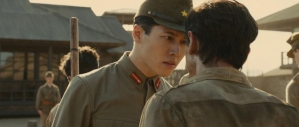
Angelina Jolie's World War II film Unbroken tells the story of a former American veteran who spent two years in various Japanese prison camps and later forgave his captors. However, her upcoming film has drawn outrage in Japan.
That's because right-wing nationalist groups in the Asian country are incensed at the depiction of the torture used against Olympic runner and Christian convert Louis Zamperini, labeling Jolie as a racist. According to Julian Ryall of The Telegraph, Japanese nationalists have called for Jolie to be banned from entering the country because she has defamed Japan.
"It's pure fabrication," Hiomichi Moteki told the Telegraph. "If there is no verification of the things he said, then anyone can make such claims."
Moteki, the secretary general of a nationalist pressure group called the Society for the Dissemination of Historical Fact, added that the movie "has no credibility and is immoral."
Japanese nationalists have objected to the depictions of Zamperini's treatment at the hands of prison guards in the 2010 nonfiction book by Laura Hillenbrand entitled Unbroken: A World War II Story of Survival, Resilience and Redemption; Jolie based her film on that book's contents. According to The Telegraph, they were particularly enraged at descriptions in the book of prisoners-of-war being "beaten, burned, stabbed or clubbed to death, shot, beheaded, killed during medical experiments or eaten alive in ritual acts of cannibalism."
Ryall reported that based on comments from social media, posters have accused Jolie, who directed the film, of "racial discrimination," while others called for protests at cinemas that decide to show the film. A petition on Change.org, which has attracted more than 8,000 signatures, demanded that Jolie halt distribution of the film on grounds that it is "contradictory to the facts," labeling her as a "demon."
Mindy Kotler, director of Asia Policy Point, thinks that it's time for Japan to face up to its brutal imperial past. She and other activists have said that criticizing Unbroken has taken "denier-history to a new level."
"Further, there is plenty of documentation on the abuse and tortures inflicted upon POWs," Kotler said. "There is also plenty of eyewitness and forensic evidence of Japanese cannibalism of prisoners as well of fellow soldiers."
Kotler adds that discrediting POW testimony "is an important step toward discrediting the war crimes trials," noting that much of the war crimes trials focused on atrocities committed against POWs. She thinks that it would be "outrageous and reprehensible to deny what happened to Louis Zamperini."
"It will not be something that the US government will be able to ignore," Kotler said. "Both the San Francisco Peace Treaty, which is predicated on acceptance of the Tokyo War Crimes Tribunal, and the honor of American veterans need to be defended."
According to Ethan Sacks of New York Daily News, the emotionally tough scenes that inflamed Japanese nationalists are based on Zamperini's own account as described in his biography. The actor who portrayed the infamous Imperial officer Mutsuhiro Watanabe, Japanese pop star Miyavi, noted that he was devastated by the experience of filming the brutal camp scenes.
"It was awful torture for me to hate the other actors," Miyavi said. "I had to have hatred for them. When I had to beat them, I had to think about protecting my family."
Miyavi wanted "to put humanity" in his role, adding that although Mutsuhiro was "both crazy and sadistic," the Imperial officer was "also weak and traumatized."
As for Zamperini himself, who died in July, the New York Daily News mentioned that his hellish ordeal as a POW at the hands of the Japanese Imperial Army lasted until V-J Day in August 1945.







